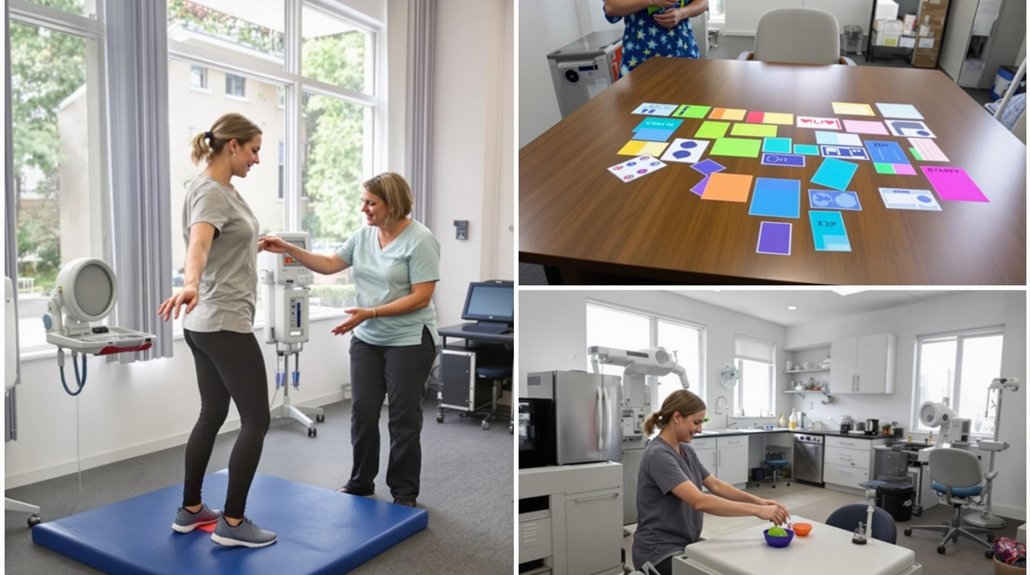You can help a TBI patient by creating a safe, organized home environment with clear pathways and consistent item locations. Establish structured daily routines, use reminder systems, and break tasks into manageable steps. Speak clearly and allow extra time for responses during conversations. Provide emotional support while encouraging independence in daily activities. Building a strong support network and understanding the recovery process will improve your ability to provide effective care.
Understanding TBI: Signs, Symptoms, and Recovery Stages
Traumatic brain injury (TBI) occurs when a sudden trauma causes damage to the brain, ranging from mild concussions to severe, life-threatening injuries.
You’ll notice both immediate and long-term symptoms, including headaches, confusion, dizziness, and changes in mood or behavior.
As you support someone with TBI, you’ll observe that recovery often progresses through distinct stages. Initially, the patient may experience altered consciousness, followed by a period of confusion and disorientation.
Cognitive deficits might affect memory, attention, and problem-solving abilities. Many patients struggle with sensory processing, becoming overwhelmed by lights, sounds, or touch.
Recovery timelines vary greatly, and some symptoms may persist for months or years.
Understanding these patterns will help you provide better support and recognize when to seek additional medical attention.
Neuroplasticity in the brain enables continuous improvement for years after the initial injury with appropriate therapeutic intervention.
Creating a Safe and Organized Home Environment
Understanding TBI symptoms and recovery stages sets the foundation for adapting the home environment. You’ll need to create organized spaces and implement safety measures to support your loved one’s recovery journey.
| Area | Safety Measures | Organization Tips |
|---|---|---|
| Kitchen | Remove hazards, label cabinets | Store frequently used items at waist level |
| Bathroom | Install grab bars, non-slip mats | Keep toiletries in clear containers |
| Bedroom | Clear pathways, proper lighting | Use color-coded storage systems |
Begin by removing tripping hazards and decluttering main walkways. You’ll want to maintain consistent locations for essential items, as this helps reduce confusion and supports independence. Install proper lighting in all areas, especially hallways and stairs. Consider using reminder systems, such as whiteboards or smartphone apps, to help with daily routines and appointments. Medicaid home health care can provide professional assistance with implementing and maintaining these safety measures while supporting optimal independence in the home setting.
Managing Daily Tasks and Routines
While recovering from TBI, patients need consistent daily routines to rebuild their independence and confidence. You can help by creating simple, structured daily schedules that break down activities into manageable steps.
Building predictable routines and breaking tasks into small steps helps TBI patients regain independence during their recovery journey.
Use task reminders like smartphone apps, written checklists, or digital calendars to help them stay on track.
Support them in completing basic self-care tasks, but avoid doing everything for them. Instead, encourage their participation by standing nearby and offering guidance when needed.
Start with familiar routines, such as morning hygiene or meal preparation, and gradually introduce more complex activities as they progress.
When they become overwhelmed, help them pause, rest, and return to the task later. Remember to celebrate their successes, no matter how small, as this builds motivation for continued recovery.
Consider working with a professional caregiver who can provide specialized recovery care to ensure safe and effective healing while minimizing complications.
Facilitating Communication and Social Interaction
For TBI patients, communication and social skills often need careful rebuilding after injury. You’ll need to employ specific communication techniques that help them process information and interact effectively with others.
| Strategy | Purpose | Example |
|---|---|---|
| Speak clearly | Aids comprehension | Use short, direct sentences |
| Allow time | Reduces pressure | Wait patiently for responses |
| Use visual aids | Supports understanding | Show pictures or write notes |
| Stay positive | Builds confidence | Praise small improvements |
When helping with social interactions, encourage small group settings first, as large crowds can overwhelm TBI patients. Support them by practicing basic social skills like taking turns in conversations and reading facial expressions. You can role-play common social scenarios to help build their confidence and gradually increase exposure to more complex social situations. Licensed physical therapists can develop customized rehabilitation plans that include cognitive skills training as part of a comprehensive recovery program.
Supporting Physical Recovery and Exercise
Since physical recovery is essential after TBI, you’ll need to work closely with healthcare providers to implement appropriate exercise routines. Supporting your loved one’s physical recovery requires patience, dedication, and careful attention to their unique needs.
Through therapeutic activities and adaptive exercises, you can help them regain strength and mobility while ensuring their safety.
- Start with gentle movements and gradually increase intensity as they build confidence and stamina
- Monitor their fatigue levels and watch for signs of overexertion during exercise sessions
- Create a welcoming, supportive environment that encourages them to push through challenges
- Celebrate small victories and progress to maintain their motivation
- Partner with physical therapists to learn proper techniques for assisting with specialized exercises
These supportive actions will contribute greatly to their physical rehabilitation journey.
Consider working with occupational therapists who can provide personalized therapy plans focused on improving daily living activities and overall independence.
Addressing Emotional and Behavioral Changes
Beyond the physical aspects of recovery, TBI patients often experience significant emotional and behavioral shifts that can be challenging for both them and their caregivers.
You’ll need to provide consistent emotional support while remaining patient through mood swings, anxiety, or depression. Create a calm environment and establish predictable routines to help reduce stress and confusion.
Don’t take emotional outbursts personally, as they’re often symptoms of the injury rather than intentional behaviors.
Work with healthcare providers to implement appropriate behavioral interventions when needed. These might include setting clear boundaries, using positive reinforcement, and breaking tasks into manageable steps.
Remember to validate your loved one’s feelings while gently redirecting inappropriate behaviors. Stay connected with support groups to learn effective coping strategies from other caregivers facing similar challenges.
Navigating Medical Care and Rehabilitation
Managing your loved one’s medical care requires coordinating with multiple healthcare providers and specialists throughout the recovery journey.
You’ll need to stay organized and advocate for the best possible care while exploring therapy options that match their specific needs.
- Track medical appointments and medication schedules in a dedicated calendar to guarantee nothing falls through the cracks.
- Create a binder with medical records, test results, and insurance information to share easily with healthcare providers.
- Research different therapy options and rehabilitation programs, then discuss them with the medical team.
- Connect with support groups to learn from others who’ve navigated similar challenges.
- Keep detailed notes during appointments and don’t hesitate to ask questions – you’re an essential part of their recovery team.
Building a Strong Support Network
While maneuvering medical care focuses on professional support, caring for a TBI patient requires building connections beyond the clinical setting.
You’ll need to create a network of people who understand the challenges and can offer practical help when needed.
Start by connecting with local support groups specifically designed for TBI patients and their caregivers. These groups provide valuable emotional support and firsthand experiences from others on similar journeys.
Support groups connect TBI patients and caregivers, offering vital emotional support and shared experiences from those walking the same path.
Research community resources that offer assistance with daily tasks, transportation, or respite care. Local organizations often maintain lists of volunteers willing to help.
Don’t hesitate to reach out to friends, family, and neighbors who can assist with specific needs.
Remember that building a support network isn’t just about getting help—it’s about creating a community that understands and supports both you and your loved one.
Practicing Self-Care as a Caregiver
As you dedicate yourself to caring for a TBI patient, it’s important to prioritize your own physical and emotional well-being. Implementing self care strategies helps prevent caregiver burnout and guarantees you can provide the best possible support for your loved one.
Remember, you can’t pour from an empty cup.
- Schedule regular breaks to recharge, even if it’s just 15 minutes of quiet time each day
- Connect with fellow caregivers who understand your journey through support groups or online communities
- Maintain your own medical appointments and healthy lifestyle habits
- Practice stress-relief activities like meditation, yoga, or journaling
- Don’t hesitate to ask for help when you’re feeling overwhelmed – accepting support isn’t a sign of weakness
Set boundaries and recognize that taking care of yourself directly benefits your TBI patient’s recovery journey.
Conclusion
Taking care of someone with a TBI is like being part of a caring team – everyone works together to help your loved one heal. Think of yourself as the team captain, guiding daily activities and making sure everything runs smoothly. While some days may feel challenging, remember that every small step forward matters. Taking breaks and asking for help isn’t a sign of weakness – it makes you a stronger caregiver.
Your dedication makes a real difference in your loved one’s recovery journey. Just as a garden needs daily care to bloom, your consistent support helps create the best environment for healing. You don’t have to walk this path alone.
If you or a loved one need help, don’t wait. Reach out to Focus Family Care today at (561) 693-1311 or email us at info@focusfamilycare.com.




